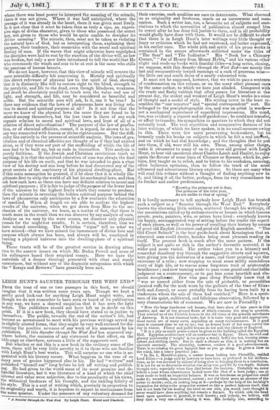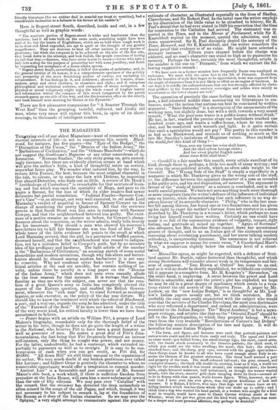LEIGH HUNT'S SAUNTER THROUGH THE WEST END.* FROM the tone
of one or two passages in this book, we should imagine that it was written some years ago. Though we kept a pretty good look-out for anything Leigh Hunt might write, and though we do not remember to have seen or heard of its publication in any way, we have a shrewd suspicion that it has seen the light before. The publishers should not have left us in doubt on this Point. If it is a new book, they should have stated so in justice to themselves. The public, towards the end of the author's life, had become so accustomed to meet with his previous writings served up Iii slightly altered forms, that they might be very well excused for dis- trusting the positive newness of any work of his announced by his publishers. If this Saunter through the West End has appeared any- where before, the omission of any statement to that effect, on the title-page or elsewhere, savours a little of the suppressio veri. But whether or not this is a new book in the ordinary sense of the term, there will be very little novelty in it to those who are familiar with Leigh Hunt's best works. This a ill surprise no one who is ac- quainted with his literary career. What happens in the case of so many men of genius happened also in his. He had "written" and published "himself out" long before he left off writing and publish- g. He had given to the world some of its most genuine and de- lightful literature, but it was literature of a kind of which the chief interest and value were subjective, due to the peculiarity of his views, the whimsical freshness of his thought; and the tickling felicity of his style. This is a sort of writing which, precisely in proportion to its originality and worth, it is hopeless to expect in continuance from the same quarter. Under the pressure of any voluntary demand for
* Baunter through the Wed Bra By Leigh Hunt. Hurst and Blackett
their exercise, ch qualities are sure to deteriorate. What charmed li
us as originality and freshness, repels us as narrowness and man- nerism. Such a writer has, too, a favourite set of subjects and asso- ciations to which the necessities of publication almost compel him to revert after he has done full justice to them, and in all probability would gladly have done with them. It would not be difficult to show that there is in Leigh Hunt's later writings very little thought or fancy or criticism which he had not expressed, and better expressed,' in his earlier ones. The whole pith and spirit of his prose works is contained in the essays afterwards collected under the titles of " The Seer" and " The Indicator." His " Book for a Chimney Corner," "Jar of Honey from Mount Hybla," and his various other slight and made-up books with fanciful titles—a long series, closing, we suppose, with this Saunter through the lrest End—are merely the last and comparatively insipid runnings of a cask of generous wine— the little ore and much dross of a nearly exhausted vein.
It must not be supposed, however, that we wish to pass a sentence of condemnation on this volume, or on the many other pleasant ones by the same author, to which we have just alluded. Compared with the crude and flashy 'rubbish that often passes for literature at the present day, the stalest and weakest of Leigh Hunt's works is a mine of thought and a model of style. His writing never in the least re- sembles the "our reporter" and "special correspondent" sort. He belonged to the pr-photographic era, and was an artist in words-.— not a mechanical reproducer of superficial impressions. His mind, too, was evidently a sincere and self-guided one; he could not transfer, or affect to transfer, his sympathies to quarters to which they did not naturally tend. The very repetition and comparative flatness of his later writings, of which we have spoken, is in no small measure owing to this. There were few more persevering bookmakers, bilt he honestly made his books on subjects in which he felt a real intffl.at, and on which he had real knowledge ; and the thoughts that be put into them, if old, were still his own. These, among other things, make it pleasanter to many of us to go over old ground with Leigh Hunt, to hear old anecdotes about Charles Lamb and Hazlitt, to enjoy again the flavour of some lines of Chaucer or Spenser, which he, per- haps, first taught us to relish, and to listen to his unshaken, amusing, often ludicrous optimism, than to follow the track of the most advanced and adventurous literary explorer. So there are many who will read this volume without a thought of finding anything new in it, and liking it all the better, perhaps, from its very resemblance to its fresher and earlier predecessors,
"Knowing the primrose yet is dear, The primrose of the later year, As not unlike to that of spring."
It is hardly necessary to tell anybody how Leigh Hunt has treated such a subject as a "Saunter through the West End." Everybody knows the charming little notices, scattered through his writings, of the associations called up by certain streets or houses in which famous people, poets, painters, wits, or actors have lived : everybody knows his happy, unexaggerated way of setting before the reader the aspect of such places, as well as his power of recalling their history by means of good old English literature and good old English anecdote. "The Old Court Suburb" is the best guide-book about Kensington that an educated man could desire, besides being most pleasant reading is itself. The present book is much after the same pattern. If the subject is not quite so rich in the author's favourite material, it is wider and more varied. The author takes you in a leisurely and somewhat desultory way through the suggestive streets and squares, here giving you the derivation of a name, and there pointing out the existence of a relic; now stopping to recal some mildly scandalous story of high life, ot to rescue some forgotten trait ot aristocratic, beneficence ; and now turning aside to pass some genial and charitable judgment on a contemporary, or to pay him some heartfelt and elo- quent compliment. Few who pass along Piccadilly know that it "was so named either from the sale of pickadils, or peccadillas (peaked ruffs for the neck worn by the gallants of the time of Eliza- beth and James), or more probably from its having been built by s tradesman whom the sale of them had enriched." Here is a speci- men of his quiet, cultivated, and felicitous observation, followed by a very characteristic bit of comment. We are now in Piccadilly : "Note the large handsome red houses, that have risen of late years in this quarter, and one of the ground floors of which contains the shop in question. They remind us of the Flemish houses in the old times of the princely merchants of Antwerp. It is not classical taste, but it is taste very good and appropriate. Good tastes are of many sorts, depending on many circumstances. It is good taste in summer.time to eat an ice' but an honest bowl of hot soup carries the day in winter. Flimsy and pallid houses do not suit the climate of England.. "It is a pity as much praise cannot be given to the building called the Egyptian Hall. Egyptian architecture will do nowhere but in Egypt. There, its cold and gloomy ponderosity weight' is too petty a word) befits the hot, burning atmo- sphere and shifting sands. But in such a climate as this, it is nothing but an uncouth anomaly. The absurdity, however, renders it a good advertisement. There is no missing its greet lumpish face as you go along. It gives a blow to the mind, like a heavy practical joke. "In No. 1, liamilton.place, a corner house looking ioto Piccadilly, resided Lord Eldon :—a judge said by lawyers to have teen as profound in his delibera- tions, as be was accused by suitors of being slow in bringing them to a conclusion. It is not for us to determine whether the delay was paid for by the depth. Suitors thought not; especially when they died before the decision. Certainly we never beheld a man whose countenance looked more like that of a born judge ; one at least made to hold an impartial balance. It was as handsome as proportion could make it; venerable, deep-browed, earnest; nor did there seem an absence of the power to decide; only, on looking long at it—perhaps by the help of his lordship's reputation for delay—the proportion seemed so like a perfect balance itself, that had it not been for his leaning tate head on one side, you would have thought it never would have done anything but remain a fixture. To which side the head leant upon questions in general, is well known ; and 'nobody, we believe, will deny that a very one-sided leaning it was. Ilia lordship also, according to
friendly historians (for we neither deal in scandal nor trust to enmities), had considerable inclination to a balance in his favour at his cashier's."
Here is Regent-street South, described, inside and out, in a few thoughtful as well as graphic words : "The southern portion of Regent-street is wider and handsomer than the northern: had it all been built on the same scale, something might have been said of it; but the hearts of Englishmen, which are so bold when rough work is to be done and blood expended, are apt to quail at the thought of any gentler magnificence. They are desirous to beat all other nations in every species of greatness; but when the conquest is to be achieved on the side of the fine arts, they break down in the attempt, and look foolish, like people conscious of having no call that way:—dancers, who have never learnt to dance :—lovers who take a lady into a shop for the purpose of presenting her with some jewellery, and finish by requesting her acceptance of a dozen albata spoons. " Regent-street South, nevertheless, is full of the abodes of architects; and, in the general interior of its houses, it is a comprehensive specimen of the activity and prosperity of the most flourishing portion of society, not excluding its advancement. It has bishops in it, and noblemen ; abounds in Lawyers, dress- makers, army and other clothiers, in chambers and clubs; and it comprises philosophical and statistical societies, and companies of steam navigation. A physical or moral voluptuary might enjoy the whole round of English luxury and information within the compass of this street (supported by the patent stomach-pump on one side of the way, and the fire-insurance office on the other), and book himself next morning for Greece or the Pyramids."
There are few pleasanter companions for "A Saunter Through the West End" than the gossiping, tasteful, cultured, and kindly old man, whose very name will endear this book, in spite of its short- comings, to thousands of intelligent readers.































 Previous page
Previous page